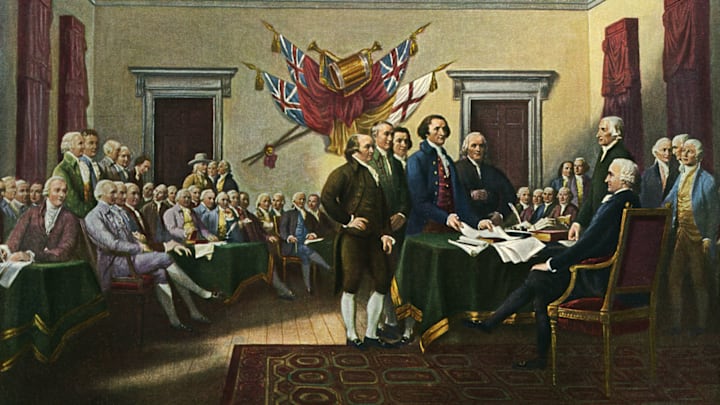One of the most famous quotes in American history comes from the Declaration of Independence, which proclaims that “Life, Liberty and the pursuit of Happiness” are “unalienable Rights.”
These days, the right to pursue happiness is often thought to concern seeking subjective joy, but language is constantly evolving. Back in the 18th century, both pursuit and happiness had secondary definitions which completely change the meaning of the iconic quote.
Jump for Joy
When Thomas Jefferson drafted the declaration in the summer of 1776, he almost certainly wasn’t thinking of the joyful emotional state when listing happiness as a right. As political science professor James R. Rogers explained in First Things, at that time happiness could also mean “prosperity” and “well-being in the broader sense.” This sense encompassed “physical needs, but it also included a significant moral and religious dimension.”
So how do we know which definition Jefferson was using? The Founding Father based the declaration on similar contemporary political documents, many of which used happiness to mean the physical and spiritual well-being of all citizens rather than an individual’s fleeting pleasure. For instance, the Virginia Declaration of Rights—written mainly by George Mason and adopted on June 12, 1776—speaks of “the enjoyment of life and liberty, with the means of acquiring and possessing property, and pursuing and obtaining happiness and safety.”

This broader meaning of happiness is even clearer in later documents. The Massachusetts Constitution of 1780 notes that “the happiness of a people, and the good order and preservation of civil government, essentially depend upon piety, religion, and morality.” Similarly, the Northwest Ordinance of 1787 declares that “Religion, morality, and knowledge” are “necessary to good government and the happiness of mankind.”
The misunderstanding over what happiness means in this context isn’t just a modern problem. In a 1786 letter to James Monroe, James Madison complained that “ultimate happiness” is often misinterpreted as the “immediate augmentation of property and wealth.” If the latter definition were accurate, he surmised that “it would be the interest of the majority in every community to despoil & enslave the minority of individuals; and in a federal community to make a similar sacrifice of the minority of the component States.”
In Hot Pursuit
There's a reason why it’s merely the pursuit of happiness that’s a right rather than happiness itself. In a 1964 article published by The William and Mary Quarterly [PDF], historian Arthur Schlesinger pointed out that while pursuit could mean “chase” or “follow,” when Jefferson was putting quill pen to paper he was likely thinking of a different definition: “The action of following or engaging in something, as a profession, business, recreation, etc.”
This meaning of pursuit is synonymous with practice and experience, and so, in Schlesinger’s words, the Declaration of Independence actually “proclaimed the practicing rather than the quest of happiness as a basic right equally with life and liberty.” The Virginia Declaration of Rights is again helpful in illustrating this, thanks to its statement about not only “pursuing” happiness, but also “obtaining” it.
Based on this reading, “the pursuit of Happiness” doesn’t mean chasing whatever your heart desires; rather, it’s about engaging in activities which support overall physical, mental, and moral well-being.
The Origin of the Phrase
While “Life, Liberty and the pursuit of Happiness” may feel like a distinctly American phrase, the Founding Fathers were actually inspired by an English philosopher. The idea traces its roots to John Locke’s Two Treatises of Government (1689), which states that mankind has a natural right “to preserve his property—that is, his life, liberty, and estate.” Jefferson replaced “estate” with “pursuit of Happiness,” but those words were also pulled from Locke. In An Essay Concerning Human Understanding (1689), the philosopher argues that “the foundation of liberty […] lies in a careful and constant pursuit of true and solid happiness.”
Although the declaration’s phrasing echoes Locke, this deeper conception of happiness dates back to at least ancient Greece. Greek philosophers—particularly Aristotle—contemplated eudaimonia, which is sometimes translated as “happiness,” but more accurately means “human flourishing” or “living well.”
The declaration’s “pursuit of Happiness” essentially repackaged the Greek concept of eudaimonia for American colonists in the 18th century. In an interview with Emory, theology professor Brent Strawn summarized that the phrase isn’t concerned with “momentary pleasurable sensations (‘I’m happy the sun came out this afternoon’) but with deep and extended qualities of life (the happiness one feels to be cancer-free, for instance).”
Read More Stories About Famous Quotes:
